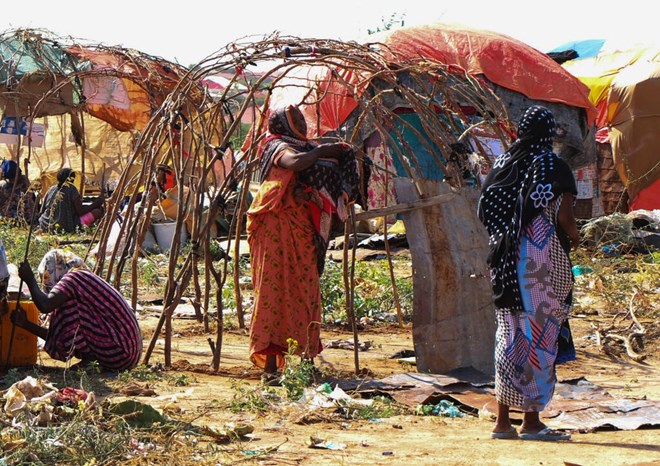Wednesday November 27, 2024
By Farah Bashir

FILE PHOTO
Recurrent and protracted displacement has been a major problem in Somalia. An estimated millions of Somalis are internally displaced due to climate-induced disasters and conflict. Mogadishu, Baidoa, and Kismayo have the highest IDP populations and returnee concentrations. These locations are key destinations due to their relative peace and access to services and economic opportunities.
The number of IDPs in Somalia has skyrocketed in the past two years, as documented by the Internal Displacement Monitoring Centre (IDMC). Approximately 3.9 million people were forced to flee their homes due to natural and human causes like conflict and violence. While acknowledging the impact of droughts, floods and wars on displacement, it is undeniable that the government evicted thousands without alternative housing options.
Evictions in Mogadishu
Mogadishu has experienced severe state-sponsored evictions. Thousands of households living in government buildings were forced to leave their homes without adequate notice or alternative solutions. Somalia has a national IDP and Refugee Commission aimed at preventing evictions. Ironically, the commission has not condemned the recurrent state-sanctioned eviction.One might question the government's right to seize its land when needed. However, is the land truly needed by government institutions? Would the buyout prices be included in the national budget even if privatized? Were there auctions or proper notice before these evictions?
As Alex de Waal notes in his book on the political marketplace, the Horn of African politics, including Somalia, is characterized by transactional politics. Incumbents pay substantial bribes during campaigns and reward their supporters after winning elections. In the past two years, the government has sold public lands in Mogadishu to business people closely connected to the presidency.
Absence of Proper Eviction Guidelines
Proper procedures should be followed to evict people from their temporary residences. This includes providing alternative accommodations with essential services. Most victims received no official notice before the forced evictions. Moreover, many residents possessed legal documents issued by the same government conducting the unlawful displacement. They were also paying land taxes to the local authorities. This raises questions about the legitimacy of these evictions. Who will provide compensation? Will the state be held accountable for collecting land taxes and issuing documents while simultaneously evicting residents?
Pursuit of Economic Opportunities in Times of Hardship
Evictions seem to be justified as a means to demonstrate loyalty and generate quick funds during an incumbent's term. The previous administration of Hassan Sheikh Mohamud engaged in similar practices. Under his leadership, the president's close associates and family members traded prominent public properties, such as the Jaayga village near the airport. State property was privatized, yet the actual figures and amounts are absent from the national budget. The entire process operates on a "gentleman's agreement" based on presidential decrees, bypassing institutional arrangements like the national auditor, accountant, and prosecutor general. Citizens remain unaware of the transactions and the individuals involved. There are no auctions or open bidding processes aligned with national legal frameworks.
These evictions have occurred amidst a deteriorating economic climate. Millions of US dollars are withdrawn from the market monthly, land prices have plummeted, and overall cash flow has drastically decreased. The government's unsuccessful wars against al-Shabaab have also contributed to these conditions. Other factors include increased investment in neighboring countries like Kenya, which has impacted local economic opportunities. Government officials, including military personnel, bureaucrats, and senior staff, have invested and purchased properties in Kenya, Turkey and other parts of the world potentially masking their earnings through foreign investments. These circumstances raise concerns about the future availability of public land for subsequent governments.
Farah Bashir is a researcher and analyst.